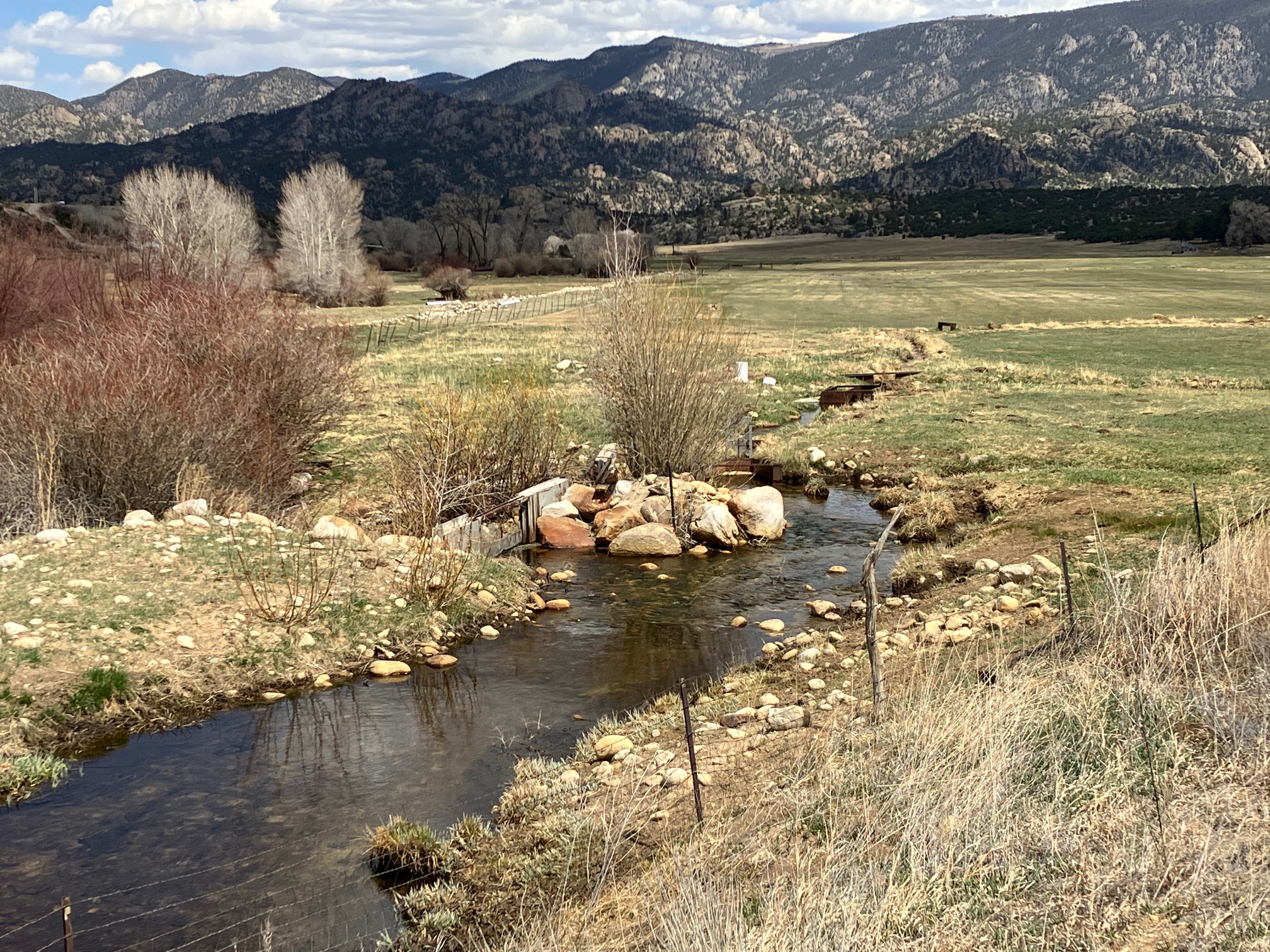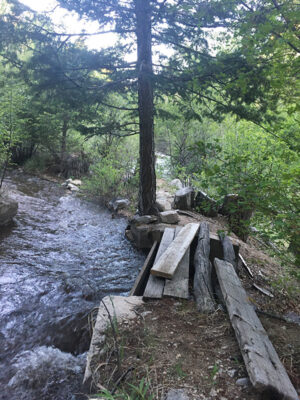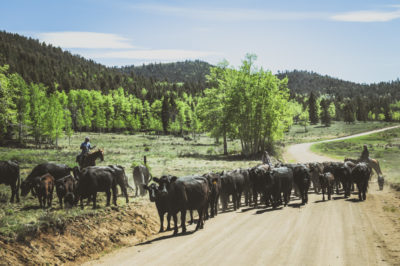
This ditch and channel redirection gates are right along U.S. 285 just north of Centerville. In the background, Browns Canyon National Monument. Photo by Jan Wondra
Newcomers to Rural Areas, Be Aware of “The Right to Ranch”
This time of year as the snow is melting off the peaks and the grass is turning green, the beauty of Chaffee County and indeed so many other central Colorado counties is magnified by the presence of life-giving water. A big part of the beauty of this county is its ranching lands and those lands add to the value of this place.
Some 97 percent of Chaffee County residents say they believe in and want to protect our county’s agricultural base. This amazing statistic from the county’s survey was a step in the preparations to create the county’s Common Ground; a three-fold effort that included protecting the county’s working lands.

The Bowen Ditch flows south of Centerville. It’s uncertain at this point how much water the local snowmelt will produce. Photo by Tara Flanagan.
So as a population, there appears to be overwhelming support in this county to protect our sweeping rural vistas, our bucolic scenes of cattle grazing on green pastures, the sight of new-mown grass and alfalfa being raked for baling.
But far fewer people actually know what it is that must be protected, or that there are state and county laws known as the Right to Ranch (and as some call it, “the right to farm and ranch”) that protect our agricultural economy.
All 50 states have some form of Right to Farm law. Until around 1980 they weren’t considered necessary. But with sprawling metropolitan areas and private development beginning to reduce available farmland, combined with mounting private and public nuisance actions against normal agricultural activities, states saw the need to enforce laws that are aimed to minimize the threat to normal farming practices. Those threats came from nuisance litigation, as well as from pro-growth local government regulations that grabbed ranch and farmland for development.
In contrast to typical farmland preservation policies, which aim to preserve farmland itself, Right to Farm and Ranch laws attempt to preserve the area’s agricultural practices and enhance farm viability.
New residents to Chaffee County, or indeed many other rural counties in Colorado — especially city folk — need to understand this reality; you are living in farming and ranching country. If we value what we say we do, then it’s up to all of us to support our ranchers and farmers.
The next time you allow your children to dam up an irrigation ditch to float boats, or you lock the gate a rancher needs open to get to his agricultural ditch, be aware that you are breaking Article 3 of The Land Use Code. Crowd a rancher moving livestock on a county road, or complain about the dust off a field and you’ll reveal yourself to be who you are — someone who doesn’t know or obey the rules of country life.
For those who have been unaware, here’s a primer on the Right to Ranch in Chaffee County:

Ditch maintenance is critically important to keep irrigation ditches functional. Photo courtesy of Central Colorado Conservancy.
Irrigation ditches
Unless you’re helping the often overworked rancher clean out an irrigation ditch — leave the ditch alone. Know that if you live by a ditch; the ditch, the water in it and the land typically 15 feet on either side of the irrigation ditch belongs to someone else.
We know it’s tempting this time of year, but the water you see might be the few days worth of the annual allotment for the rancher down the hill. Don’t mess with it. This ditch and this water is not yours to dam, to fill with junk, to impede, to divert, or to play in. Any structures of yours can’t be within 20 feet of an irrigation ditch.

The Bowen Ditch uses old technology to direct its waters. Much of the old structures, however, are starting to fail. Photo by Greg Wright.
The responsibility to maintain the ditch belongs to the ditch owner. This means you can’t do anything to prevent the ditch owner from getting to that ditch to do just that. Block it, and you’ll find law enforcement at your door.
There are ditch companies in this valley that are still in court over the actions taken by neighbors to block them from accessing their ditches.
Want to put in a ditch crossing? Well, that depends on the approval of the ditch owner. Don’t know who that is? — you should. Often the ditch owner is a consortium of ranchers and landowners — such as those dozens who own shares in the Bowen Ditch — the longest agricultural irrigation ditch in the county.
Ag equipment and livestock on the Road
Expect it. This is ranching and farming country and rancher have road rights. This time of year is planting time, ditch-clearing time, and fencing season.
Find yourself behind a tractor with a slow-moving vehicle sign on it or a pickup loaded with hay bales? Breathe– and enjoy the scenery. When it’s safe to pass — wave or give a thumbs up – – a lot of ranchers could use the encouragement.
The herds often get moved between pastures to take advantage of early spring grass. Come later this spring, herds will get moved up to forest service grazing contracts above the valley. Often the cattle drives are on the roads. It requires patience — don’t honk and spook a herd. Just slow down and revel in the pure enjoyment of watching the drive and realizing you are witnessing part of the real American West. Pray that it doesn’t disappear.
Want to complain about those forest land grazing contracts? You should understand that they make our green meadows possible. By allowing ranchers to take at least one crop, hopefully, two crops of hay off a valley meadow to see them through the winter might mean the difference between them continuing to ranch or selling out.

Cattle drive along the Ute Trail. photo credit S. Hobbs
Noise, Dust, and the Perfume of the Country
Among the biggest sources of conflict between those newly come from the city, and those who know the country is the reaction to the byproducts of agriculture.
City people might wax poetic about the quiet country life, but country reality includes the noise of machines; the dirt and dust to prepare a field for planting or for harvest and it might be late at night because that’s the way it is.
Live next to a cattle pen and you’ll know the smells of the country include manure and mud. If you see a rancher in clean boots, he’s probably going to town or church.
The Fencing Rule
OK — here’s a big one for city folks. Colorado is what is called an “open range” state.
Here in the country, ranchers don’t fence cattle in. If you don’t want cattle in your fancy country yard, then you are going to have to fence cattle out.

The Carrigans own six working dogs, specifically bred as livestock guardian dogs. Two of the six are Great Pyrenees, one pictured here. Courtesy photo.
Dogs are the exception — if you have dogs as pets, in this state you have to fence them in so they don’t chase livestock or wildlife.
Working dogs have a purpose; they herd cattle, hold predators at bay, and protect livestock and flocks from night predators. This difference has often been completely misunderstood and more than one farmer or rancher in the valley has had to go to court to fight for their working dogs.
Local laws represent support for farming and ranching practices by a community and they are supposed to define the extent of protection farmers and ranchers actually receive from nuisance suits and inappropriate regulation. But uninformed neighbors aren’t the only challenges to ranching the Arkansas River Valley.
Over the next month, Ark Valley Voice will be running a once-a-week series on the economics of agriculture in this valley, talking to ranchers and agricultural producers about what it takes to make a living here — and the effort it takes to stay on the land.
Editor’s Note: Publisher and Managing Editor grew up on a family dairy farm in Wisconsin, and spent her childhood in 4-H and Junior Leaders. Her brother now runs that farm and shared that a few years ago while combining corn, a new neighbor who had moved from the city into the neighboring “farm-ette” came marching across the field and demanded he turn off his combine because her children were taking their afternoon nap. Explaining country to people who have never lived in it before can tax the best of us.






I’m embarrassed to admit that I lived in Chaffee County for 20 years, after living elsewhere, and I never understood the practices and rules you lay out in this article. I always admired the vistas and the green fields and realized how important the agricultural way of life was to maintaining those, but I didn’t know how it worked. I hope lots of people read this article.
We’ve been here 40 years and have no problem with our rancher neighbors. It’s the recently added farm that is the problem. Though we realize they have to make noise and dust to plow, they are also supposed to work with their neighbors in order to prevent problems. As citizens, you are required to work with them – or attempt to before complaining. Unfortunately these days there is a younger generation that appears to believe that they can do whatever they want to and refuse to work with you. They appear to feel it is their right to do whatever they want regardless of the impact on your pre-existing home and refuse to even warn of spraying or keep spray from your organic garden by plowing when the wind is lower during certain times of the day. Ranchers and farmers are requested to keep a border to keep in their dust. Our rancher neighbor never has a dust problem and in fact prevents the dust from the quarry from reaching us as heavily. The problem in this county is the change in the nature of the people you must deal with. Now instead of dealing with issues like deer stuck in their fence, one of our neighbors chooses to blame the neighbor for being upset by the deer harming itself while they refuse to let it out because of their dislike of the neighbor. They laugh when you report their animals loose and refuse to deal with that situation. If the nature of the farmer is going to change then the laws need to change because requiring a person to deal with them may cause retaliation rather than any type of working with their neighbors who are required to deal with them directly. It’s a shame you can’t safely work with a neighbor, but that is the situation we have been in the last decade and it causes us to have to avoid our own garden from the dust and to avoid bullying that we’ve gotten from truck, atv and drone as well as gunfire.